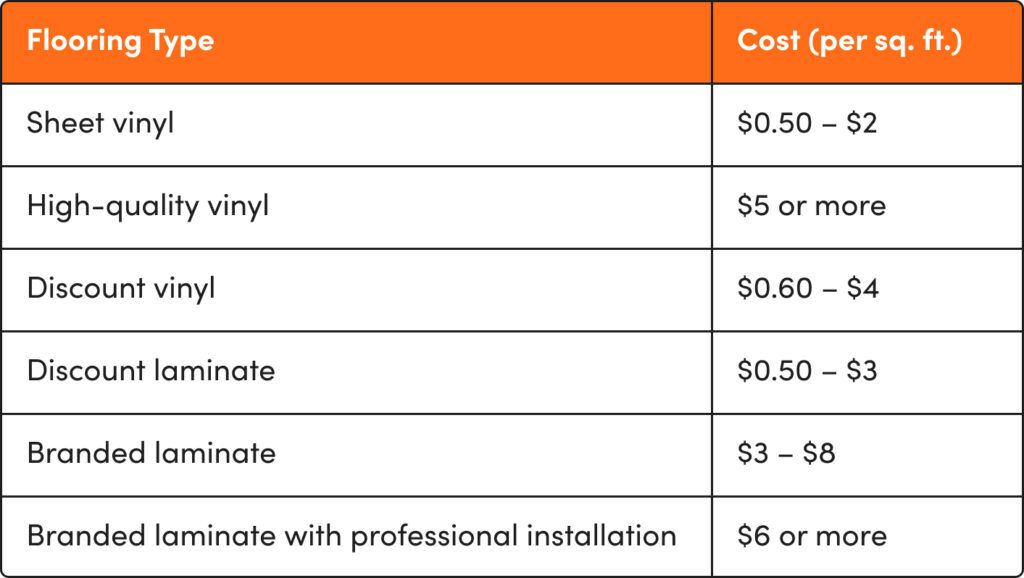Your home’s flooring isn’t something you want to wing. There are few moments when you aren’t standing on your floor, and even then, you probably have it within view.
But with so many flooring types, some options may look and act similar. Examples include hardwood and engineered wood, ceramic and porcelain tile, and laminate and vinyl flooring.
Vinyl and laminate flooring are, in fact, very similar but have some important differences. You will want to consider these differences when deciding between vinyl or laminate flooring for renovation or a new home.
For example, although laminate and vinyl flooring both function to resemble natural materials, the two flooring types differ in their primary materials, affecting their water resistance.
We’re here to help you further distinguish laminate versus vinyl flooring.
What is Laminate Flooring?
Laminate flooring is so named because its planks are made of four bonded—or laminated—layers, one of which is a wood fiberboard core. Fiberboard is made of compressed wood fibers and glue, giving it high density.
This wood byproduct material in laminate flooring makes it partially organic, decreasing water resistance.
In order from top to bottom, the four layers of laminate flooring are the:
- Clear wear layer
- Design layer
- Fiberboard core
- Built-in foam or paper underlayment (material that separates the flooring from subfloor)
What is Vinyl Flooring?
In contrast, vinyl flooring is made of completely synthetic plastic and comes in planks, tiles, or sheets. It also has four layers but can have more if it’s a thicker luxury vinyl. None of these layers contain organic material like wood, making it waterproof.
The four vinyl flooring layers from top to bottom are the:
- Clear wear layer
- Design layer
- Thick core layer
- Built-in cork or foam underlayment
Is Laminate Flooring the Same As Vinyl Flooring?
No, but they share the following similar characteristics:
- Click-and-lock installation process
- Natural material resemblance
- Lower cost
- Easy cleaning and maintenance
- Basic heat resistance
- Lifespan
- Resale value
While laminate and vinyl flooring are similar, we’ll analyze the subtle differences of each of these characteristics below.
What’s the Difference Between Laminate and Vinyl Flooring?
Though laminate and vinyl flooring are similar at face value, they have some key differences as we go through the characteristics below.
You’ll find that many of these differences below, like appearance, installation, and durability, present choices that are mainly dependent on your preference or circumstances.
Appearance: Vinyl vs. Laminate Flooring
Overall, laminate flooring is more appealing because its top layer is smoother and more realistically resembles hardwood. Laminate flooring also features a range of natural wood and stone flooring looks.
On the other hand, only high-quality vinyl flooring, like luxury vinyl plank (LVP) and luxury vinyl tile (LVT) flooring, offers a photographic layer under the clear wear layer.
Vinyl flooring has a more textured surface, creating a less authentic look than laminate flooring.
Cost: Vinyl vs. Laminate Flooring
While laminate and vinyl flooring are cheaper than natural materials, vinyl flooring is typically less expensive, especially when it comes to sheet vinyl flooring. Generally, the thinner the flooring material, the cheaper it gets.
Sheet vinyl flooring comes in rolls that you can cut to fit the size of a room. Sheet vinyl costs between $0.50 and $2 per square foot, although you will likely need to hire a professional to install it, which raises the overall cost.
High-quality vinyl flooring that you can install yourself, like LVP and LVT, costs about $5 or more per square foot. Discount vinyl flooring can be between $0.60 and $4 per square foot.
Laminate flooring is generally cheaper at discount stores, costing between $0.50 to $3 per square foot. However, thicker, branded laminate planks range from $3 to $8 per square foot.
When a professional installs branded laminate planks, the price goes up to $6 or more per square foot.
Below is a table showing laminate vs. vinyl flooring costs.

Installation: Vinyl vs. Laminate Flooring
Laminate flooring can be simple to install on your own. It uses the click-and-lock installation technique, where one side of the plank has a thin slot, and the other has a thin tab to connect planks across the floor. This installation technique closes the seams between planks.
Installing laminate planks creates a “floating floor,” which means there is no underlying material to glue or fasten the flooring to the subfloor.
Vinyl plank flooring also uses click-and-lock installation, but other types of vinyl flooring may require glue or other fasteners.
Sheet vinyl flooring is most difficult to manage because the rolls are heavy and require exact cutting for your room. As we stated in the cost section, you’ll need a professional to handle sheet vinyl installation.
Lifespan: Vinyl vs. Laminate Flooring
If you’re taking the time to research which type of flooring to get for your home, you hopefully will take the time to properly maintain and clean the material once you get it.
As such, laminate flooring that is properly cared for will last about 10 to 25 years. That means keeping it mostly dry and out of extreme heat.
Thinner vinyl flooring is limited to less than a decade, while luxury vinyl flooring can persevere for up to 20 to 25 years.
Maintenance and Durability: Vinyl vs. Laminate Flooring
Both vinyl and laminate flooring are durable and easier to clean than hardwood flooring because of their plastic wear layers, which make them stain-resistant. Don’t freak out if you spill cheese dip on the floor while rushing to catch your favorite show.
However, because laminate flooring is vulnerable to moisture, you should avoid using a wet mop and cleaning products to clean it. Instead, opt for dry mopping or sweeping. Laminate flooring will deteriorate if you expose it to too much moisture.
Vinyl flooring allows for the full cleaning experience, from using safe cleaning products to wet mopping.
Vinyl flooring is also more durable than laminate flooring and is the pet-friendly option because it’s more resistant to scratching. Luxury vinyl also better absorbs the clacking of your pet’s toenails on the floor.
However, laminate planks and thick vinyl planks can wear down over time and “delaminate.”
Thinner vinyl flooring, like sheet vinyl, won’t delaminate because it’s a single continuous sheet of vinyl.
Comfort: Vinyl vs. Laminate Flooring
While both flooring types are easy on the feet and the ears when walking, laminate flooring can feel warmer and more cushiony if the planks have an underlayment, like foam.
Vinyl flooring of the plank, tile, or sheet varieties can be harder and colder on bare feet. This is especially true when you install them over ceramic tile or concrete.
Water Resistance: Vinyl vs. Laminate Flooring
Vinyl flooring beats laminate flooring by having more water resistance because it’s made entirely of plastic. Spilling water on vinyl flooring won’t damage it, even if you forget to dry it up for a while.
Laminate flooring has a wood byproduct core, so exposure to water will disfigure it after it dries. The wear and design layers may also peel away if they endure too much moisture.
You will need to replace laminate flooring after it’s damaged.
If you’re thinking of vinyl or laminate for the kitchen and bathroom, vinyl flooring is the better option for both rooms because of high moisture levels.
Heat Resistance: Vinyl vs. Laminate Flooring
Neither laminate nor vinyl flooring is particularly resistant to extreme heat, though this isn’t a big problem because you rarely experience extreme heat in the home.
The fiberboard core inside the laminate flooring is resilient to heat, but the surface wear layer can burn if you spill or drop extremely hot substances on it. Laminate flooring also expands and contracts if the temperature in the room changes all the time, so it’s important to include an expansion gap around the perimeter of the floor.
Vinyl flooring’s surface will also burn if it comes in contact with something extremely hot, but it doesn’t experience physical changes from normal rises and dips in temperature.
Eco-Friendliness: Vinyl vs. Laminate Flooring
Because they’re both made with plastic (vinyl itself is plastic), neither laminate nor vinyl flooring is environmentally friendly.
Laminate flooring is made with an organic wood byproduct core and sometimes qualifies for Recycled Content status. Realistically, though, the process manufacturers use to make resin for the core produces harmful chemicals.
Similarly, vinyl flooring has made headway in the eco-friendly space by having Low-Emitting Material options, but vinyl itself is not biodegradable in landfills once you eventually discard it.
Resale Value: Vinyl vs. Laminate Flooring
Over the years, vinyl flooring’s reputation has improved regarding home resale value. New vinyl flooring options are thicker and better resemble natural materials.
Though less effective than natural wood flooring, high-quality laminate flooring does a solid job of increasing resale value compared to most vinyl flooring.
Of course, it helps to stay on top of proper upkeep for your flooring to prevent damage and wear.
Where Can You Find Laminate and Vinyl Flooring?
Check out the popular brands for laminate and vinyl flooring below.
Laminate Flooring Brands
- Pergo
- Shaw Industries
- Mannington Mills
- TecWood
- AquaGuard
- Dream Home
- QuickStep
- Armstrong
- Mohawk
- Stainmaster
Vinyl Flooring Brands
- Shaw Flooring
- COREtec
- Mohawk
- NuCore Flooring
- Home Decorators Collection
- Cali Bamboo
- Karndean
- Armstrong
- Flooret
- Pergo
So, Which Is Better: Vinyl or Laminate Flooring?
From an overview, laminate flooring is generally nicer in appearance, lower in cost, and more comfortable to tread barefoot.
At the same time, vinyl flooring offers water protection, a longer lifespan, and more durability.
If you’re a more practical homeowner, vinyl flooring might be more your speed. Meanwhile, laminate flooring might be on your level if you prioritize style and comfort.
As with most home decisions, the ultimate right choice depends on the home and the homeowner.
Once you gauge the differences between vinyl and laminate flooring and you know what you want, floor it.
